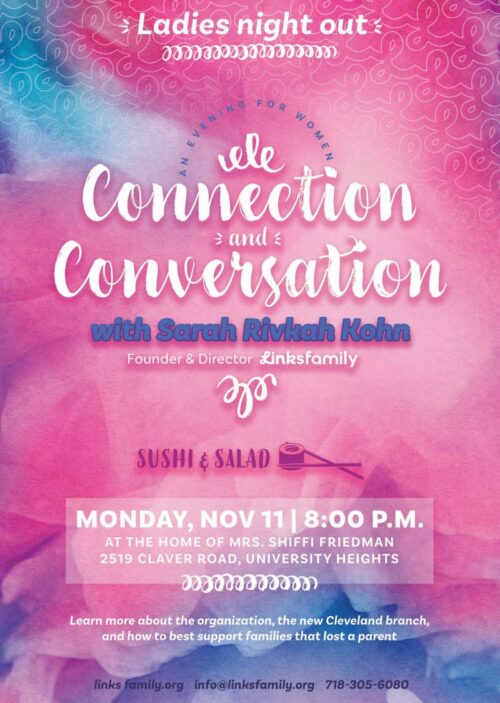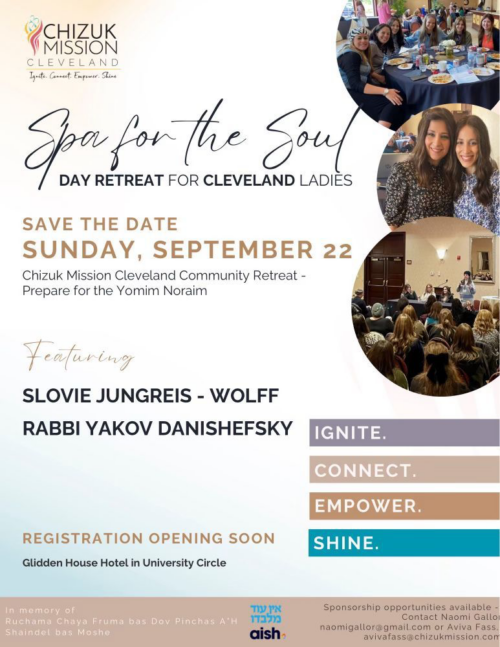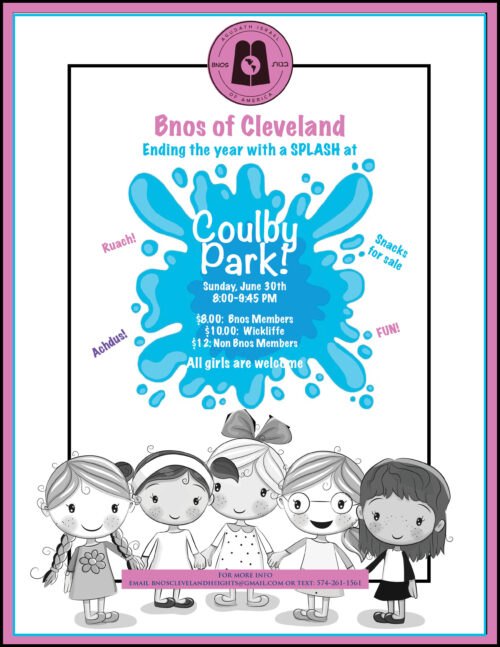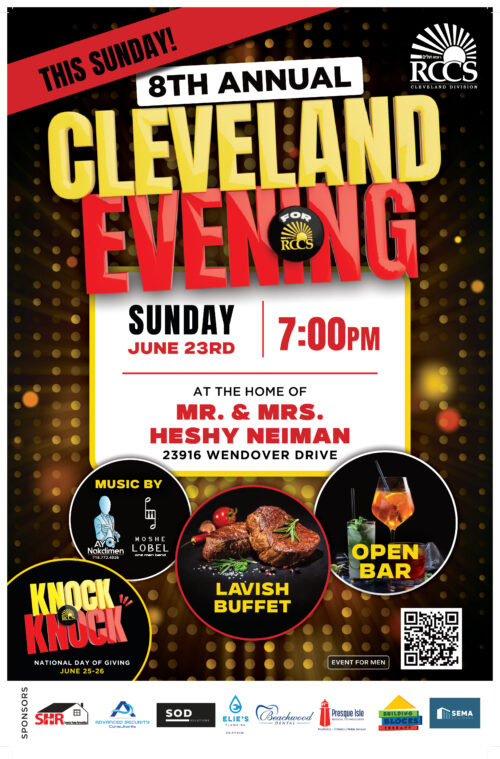5th Annual Musical Tu B’Shvat Celebration for Women, February 12th
5th Annual Musical Tu B’Shvat Celebration for Women, February 12th
5th Annual Musical Tu B’Shvat Celebration for Women, February 12th
5th Annual Musical Tu B’Shvat Celebration for Women, February 12th
Message from Hatzalah’s Rabbinic Board Re: Calling Hatzalah on Shabbos
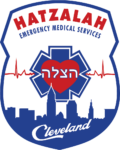 Ed. note: For all medical calls dial 216-888-1818. Hatzalah’s other number is an information/business line only, answered by voicemail.
Ed. note: For all medical calls dial 216-888-1818. Hatzalah’s other number is an information/business line only, answered by voicemail.
With the imminent launch of Hatzalah, the public is reminded that in case of emergency, one must call on the phone for help, even on Shabbos. ‘Emergency’ is defined as a “potentially life-threatening situation”, even if there is only slight risk that the current condition could deteriorate further and endanger the patient’s life. This is because Shabbos is suspended even for Safek Pikuach Nefesh, and we do not follow the majority in situations of Pikuach Nefesh.
For example, if a patient has an infected wound, Hatzalah and emergency services should be called on Shabbos, even though it is uncommon for infected wounds to be fatal. However, if a wound is not currently infected, Shabbos is not suspended (unless this wound would develop into a life-threatening situation most of the time).
If a medical situation arises on Shabbos, and you are unsure if it is classified as an emergency, it should be treated as life-threatening and Hatzalah should be called.
All calls to Hatzalah should be made without hesitation, without shinuyim, and by phone to the Hatzalah Emergency line. The public is urged to pre-program their phones, so that calling Hatzalah requires minimum dialing. This will expedite treatment of Pikuach Nefesh, and minimize meleches Shabbos.
Please reach out to Hatzalah’s non-emergency line with any questions. We urge the community, especially those with known medical issues, to seek additional guidance from your family’s Halachic authority, when Hatzalah should be called on Shabbos.
The Rabbinic Board of Cleveland Hatzalah
- HaRav Baruch Hirschfeld, Shlit”a, Posek
- Rabbi Nissim Abrin, Rabbinic Admin
- Rabbi Ari Spiegler, Rabbinic Admin
5th Annual Musical Tu B’Shvat Celebration for Women, February 12th
Hatzalah Cleveland Launch Announcement
Click to listen to the message members received as Hatzalah Cleveland went live.
Hatzalah Cleveland Launches!
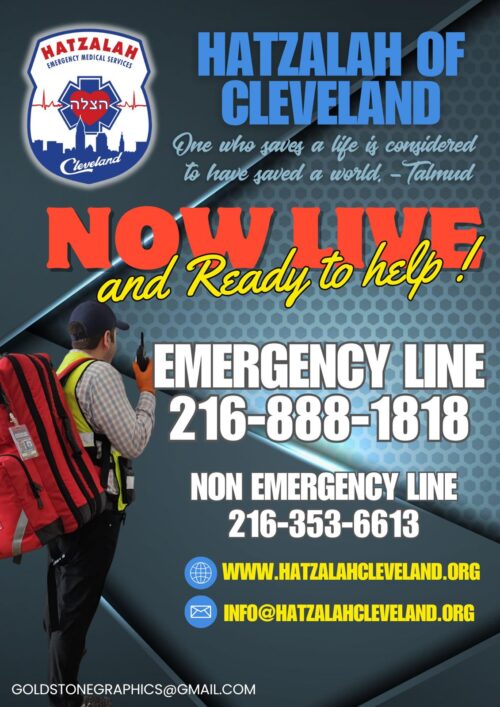 For emergencies dial 216-888-1818.
For emergencies dial 216-888-1818.
Hatzalah Cleveland is thrilled to announce that we have officially launched our emergency medical services, proudly serving the communities of Beachwood, Cleveland Heights, and University Heights. Our highly trained volunteer responders are now on call 24/7 to provide rapid and compassionate care during emergencies.
This milestone was achieved thanks to the exceptional support of University Hospitals, including the guidance of Dr. Dan Simon, Dan Ellenberger, EMS Director, and the outstanding team at the University Hospitals EMS Institute. Their expertise and collaboration have been invaluable in preparing our team to deliver top-tier pre-hospital care. We also extend our sincere thanks to all who have guided us and gave up of their time to help us reach this milestone.
If you or someone you know is experiencing a medical emergency in our service area, please call 216-888-1818 for immediate assistance. Our mission is to ensure fast, reliable, and culturally sensitive care to all who need it, no matter the time of day.
Hatzalah Cleveland is honored to join the network of Hatzalah chapters worldwide, united by our shared mission to save lives and support our communities.
For more information visit www.hatzalahcleveland.org.
Connection and Conversation with Sarah Rivkah Kohn, Monday, November 11th
Connection and Conversation with Sarah Rivkah Kohn, Monday, November 11th
Connection and Conversation with Sarah Rivkah Kohn, Monday, November 11th
Hachnasas Sefer Torah, Sunday
Hachnasas Sefer Torah, Sunday
Save the Date! Chizuk Mission Cleveland Day Retreat!
Save the Date! Chizuk Mission Cleveland Day Retreat!
Heights Jewish Center Picnic & Barbecue, Sunday!
Heights Jewish Center Picnic & Barbecue, Sunday!
Heights Jewish Center Presents Jeff Jacoby, this Shabbos and Sunday
Heights Jewish Center Presents Jeff Jacoby, this Shabbos and Sunday
Bnos Swimming at Coulby Park, Sunday
Bnos Swimming at Coulby Park, Sunday
This Sunday! RCCS Cleveland 8th Annual Event
This Sunday! RCCS Cleveland 8th Annual Event
This Sunday! RCCS Cleveland 8th Annual Event
This Sunday! RCCS Cleveland 8th Annual Event
Telshe Yeshiva Annual Dinner, June 18th
Telshe Yeshiva Annual Dinner, June 18th
This Sunday! RCCS Cleveland 8th Annual Event
Telshe Yeshiva Annual Dinner, June 18th
- 1
- 2
- 3
- …
- 99
- Next Page »


